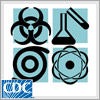
Listen to/view CDC podcasts on your computer or download them for reliable health
and safety information when and where you want it. New to podcasting? See
Podcast Help and RSS Help
PERCC Tools: Public Health Preparedness for Clinicians

CDC’s Office of Public Health Preparedness and Response funds Preparedness and Emergency Response Research Centers (PERRCs) to examine components of the public health system. This podcast is an overview of mental and behavioral health tools developed by the Johns Hopkins PERRC. Created: 8/29/2011 by Emergency Risk Communication Branch (ERCB)/Joint Information Center (JIC); Office of Public Health Preparedness and Response (OPHPR). Date Released: 8/30/2011. Series Name: COCA Commentary.
Press Play to listen to this CDC Podcast
Running time = 3:31
To save the Podcast, right click the "Save this file" link below and select the
"Save Target As..." option.
How are we
doing?
Podcasting Resources
Contact Us:
- Centers for Disease Control and Prevention
1600 Clifton Rd
Atlanta, GA 30333 - 800-CDC-INFO
(800-232-4636)
TTY: (888) 232-6348 - Contact CDC–INFO

